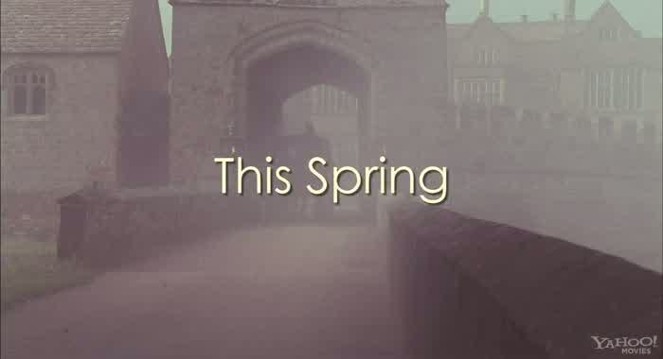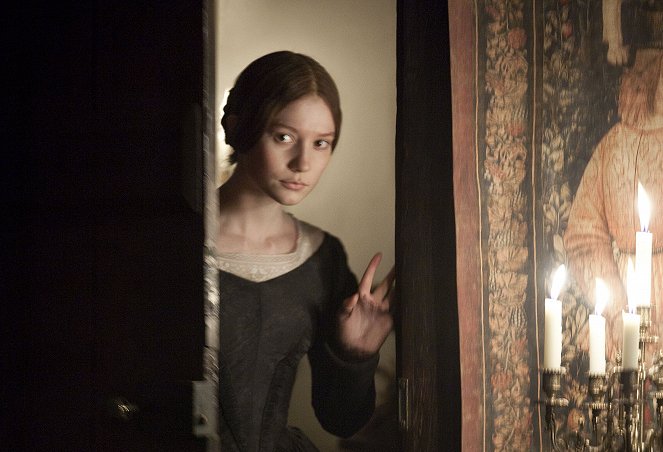Directed by:
Cary Joji FukunagaScreenplay:
Moira BuffiniCinematography:
Adriano GoldmanComposer:
Dario MarianelliCast:
Mia Wasikowska, Michael Fassbender, Judi Dench, Jamie Bell, Su Elliot, Holliday Grainger, Tamzin Merchant, Amelia Clarkson, Craig Roberts, Sally Hawkins (more)VOD (1)
Plots(1)
Based on Charlotte Brontë's classic novel, Jane Eyre flees Thornfield House, where she works as a governess for wealthy Edward Rochester. The isolated and imposing residence, and Mr. Rochester's coldness, have sorely tested the young woman's resilience, forged years earlier when she was orphaned. As Jane reflects upon her past and recovers her natural curiosity, she will return to Mr. Rochester, and the terrible secret that he is hiding... Starring Mia Wasikowska( as Jane Eyre), Michael Fassbender (as Mr.Rochester) and Jamie Bell (as St. John rivers). (official distributor synopsis)
(more)Videos (2)
Reviews (12)
A triumph of classicism, filmmaking and romantic proprieties. If I didn't know the actors, I'd have trouble dating the movie. Anyway, it's because of the actors and some wonderful romanticizing compositions that Jane Eyre is worth it. I'm just a little sorry that Fukunaga didn't keep it for his retirement and boldly did not go back to where he left off with Sin Nombre.
()
An exquisite Victorian romance, perfectly in tune with the current formal and aesthetic trends of modern filmmaking. Raw cinematography, zero pathos and spare dialogue passages, where everything is focused on editing, the actors' facial expressions and overwhelmingly unspoken emotions. Very modern yet period-accurate and full of the traditional values we love so much in these tales of fate from yesteryear. You'd almost want to say that these cinematic affairs were left in the dust somewhere in the late nineties, but thankfully that's not true, they're still around today, they're just far fewer and of a good quality.
()
Extreme romanticism via an atmosphere à la Gothic horror. Simply gestures instead of speeches. Courting by the fireplace through verbal exchanges that make Nadal versus Federer a boring watch. It’s hopes of being movie theatre experience of the year are dashed by the emotionally chilly ending where gestures gave way to speeches and other maladies very familiar in most adaptations of the classics of Romanticism.
()
Old-fashioned English romantic dramas aren’t the kind of genre that I would go after, but the good reviews drew me to the cinema (it’s not that there are that many good films this summer to let this one pass :-D), and I don’t regret it. It’s a brilliantly made film that managed to hold my attention. Rather than romantic, as in romance, I felt it was more romantic as in romanticism, because the romance itself doesn’t work so well, but the gloomy atmosphere of the English countryside was wonderful. Fukunaga could have a go at horror for his next film, when it comes to scares, he managed some interesting things in those scenes.
()
- I dream. - Awaken then. Jane Eyre is a mature synthesis of two “women’s genres”: melodrama and gothic horror. The narrative complies with the intentions of feminist discourse, taking into account the numerous restrictions that 19th-century women had to overcome, while not hyperbolising them to such an extent that the film would become another hopeless story of female suffering. The protagonist is self-confident and conscious of her abilities, and her calm dialogues with her “master” do not correspond to the traditionally depicted relationship between superiority and subordination. Cautiously being in love without fully giving herself over to her partner blunts the sentimental edges of the melodramatic level and makes it impossible to watch Jane Eyre as a straightforward tear-jerker. Fukunaga’s adaptation uses the classic novel to pose topical questions without doggedly striving for modernity in any other aspects of the film – cinematography, production design, the characters’ vocabulary. In other words, the film’s creators interpret the original novel as people instructed by developments in thinking about the social position of women, and as such logically project into it what Brontë could only consider to be a utopia in her time. Thanks to that, the film achieves an extraordinary balance between the modern and the classic. 85%
()



Ads